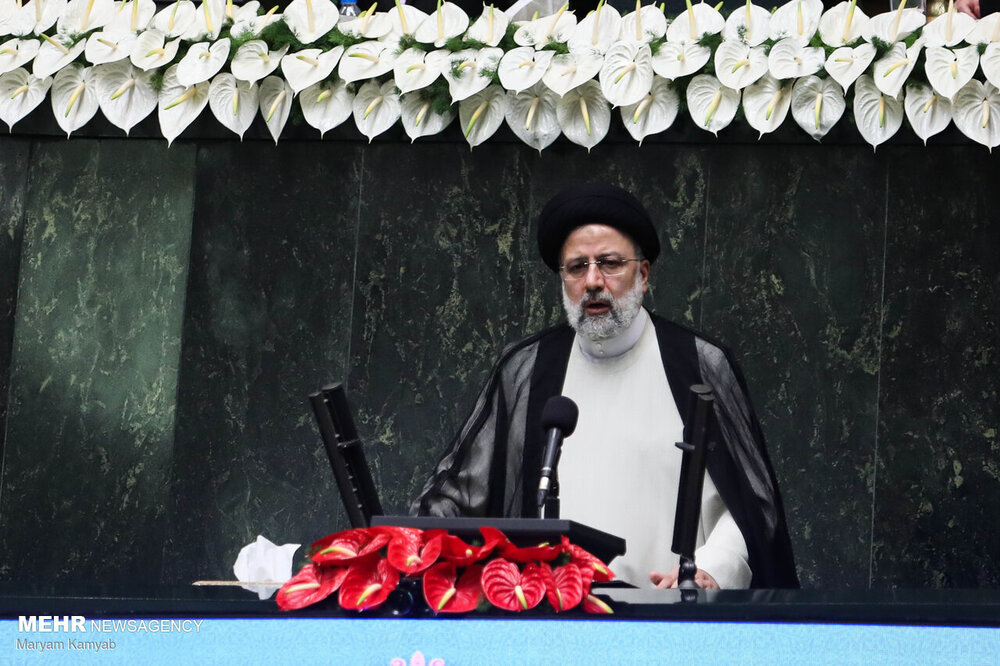Raisi officially takes oath of office as Iran's president

TEHRAN — Ebrahim Raisi was formally sworn in as the eighth president of the Islamic Republic of Iran on Thursday afternoon.
The swearing-in ceremony was held in the parliament, which was attended by senior Iranian civil and military officials as well as a large number of foreign dignitaries from more than 80 countries.
The ceremony started with speeches by Parliament Speaker Mohammad Baqer Qalibaf and Judiciary chief Gholam Hossein Mohseni Ejei.
This is the text of the oath of office by the president:
“I, as the President, upon the Holy Quran and in the presence of the Iranian nation, do hereby swear in the name of Almighty God to safeguard the official Faith, the system of the Islamic Republic and the Constitution of the country; to use all my talents and abilities in the discharge of responsibilities undertaken by me; to devote myself to the service of the people, glory of the country, promotion of religion and morality, support of right and propagation of justice; to refrain from being autocratic; to protect the freedom and dignity of individuals and the rights of the nation recognized by the Constitution; to spare no efforts in safeguarding the frontiers and the political, economic and cultural freedoms of the country; to guard the power entrusted to me by the nation as a sacred trust like an honest and faithful trustee, by seeking help from God and following the example of the Prophet of Islam and the sacred Imams, peace be upon them, and to entrust it to the one elected by the nation after me."
"We must solve problems and avoid resorting to excuses"
At the inauguration ceremony, Qalibaf first greeted the Iranian nation on the successful holding of the presidential election and welcomed foreign guests who had taken part in the inauguration ceremony.
Then the top parliamentarian pointed to the challenges facing the country and the people, especially economic ones, and emphasized the importance of taking decisive action to solve them without any making excuses.
"We have entered a new stage of management in the country. The people participate in parliamentary and presidential elections, give us the opportunity to solve the problems of the people, especially the problems that plague the middle class and the disadvantaged, in order to show that the jihadi (strong and firm) management system is the solution to all the material and spiritual problems of the country," stated Qalibaf who was Tehran mayor for 12 years.
The speaker emphasized the importance of advancing national efficiency and accountability in the new era, and stated that all Iranian officials are responsible to restore economic stability and create hope and joy among the public.
The government assumes the main responsibility in this regard because it has the highest executive capacity, Qalibaf said. However, he added, coordination and cooperation among all government branches play a leading role in overcoming challenges.
"We know that threats and sanctions from the enemy have brought difficulties to the management of the country, but there are also considerable sacred, popular, economic and international capabilities that can help us overcome these challenges," said the top parliamentarian.
"Judiciary ready to help the new government in corruption fight"
Mohseni Ejei also said the Judiciary is ready to help the government in fighting corruption.
He added that according to the constitution, the president is the highest-ranking official after the Leader and has the responsibility to implement the constitution.
The Judiciary chief wished the president success in fulfilling such an important duty in cooperation with other government bodies, the elites, and the public.
The Judiciary chief expressed hope that Raisi will take measures as soon as possible to solve the people’s problems, counter corruption and discrimination, and modify the complex administrative structure.
Mohseni Ejei emphasized that the Judiciary is ready to support the new government, help spread justice, support the legal rights and freedoms of the people and fight corruption.
He added, "The Judiciary will fight corruption more seriously than ever."
82 countries send delegates to the inauguration ceremony
More than 100 officials from 82 countries took part in the Raisi inauguration ceremony, including 10 heads of state, 20 parliament speakers, 11 foreign ministers and 10 other ministers, as well as special envoys, deputy parliament speakers and chairmen of parliamentary commissions and parliamentary delegations.
A high-level delegation from the European Union (EU) led by European External Action Service the Deputy Secretary General Enrique Mora also participated in the inauguration. Mora was accompanied by Stephan Klement, head of the EU delegation to the international organizations in Vienna, and Head of Task Force European Union Bruno Scholl.
Two days prior to the swearing-in ceremony, Leader of the Islamic Revolution Ayatollah Ali Khamenei endorsed Raisi who won the June 18 presidential election overwhelmingly. He won nearly 62% of the votes, succeeding Hassan Rouhani.
The Leader urged the new president to work to activate the country's capabilities and pave the way for large-scale development in all fields, with special emphasis on the economy.
